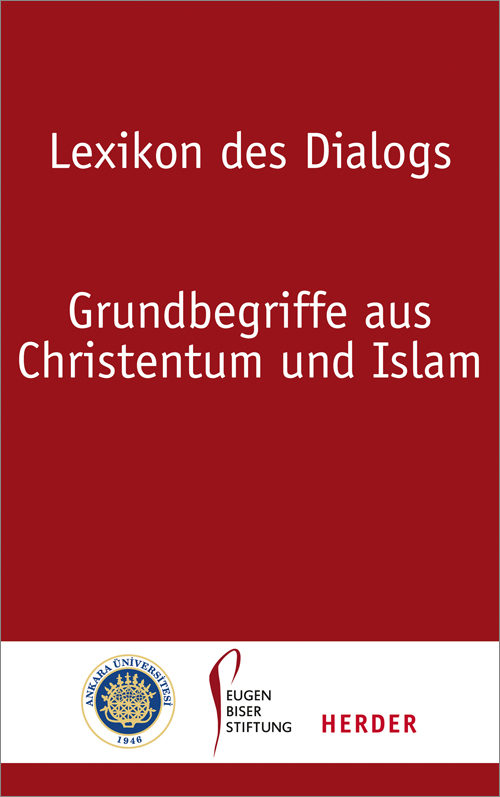Christianity and Islam on Equal Terms

There are many reasons for interfaith dialogue, but talks are often concluded with a sense of deflation at the realisation that participants have been talking past each other. Although the same terms are used, those involved attach different meanings to them. Or there are different words for the same meaning. Communication is difficult, the route to understanding paved with misunderstandings that repeatedly crop up.
Incidentally, the same also applies not only to religious, but also to political and social terminology. For example, many Muslims associate the word 'integration' with the idea of fitting in, or assimilation, and therefore reject it. But this is all about to change. It is hoped that a fundamental reference work explaining key terms and concepts in Christianity and Islam will foster a sustainable basis for further dialogue between the two monotheistic religions.

An elaborate undertaking
The volume required an understanding that was a long time coming. For seven years, some 100 Christian and Muslim researchers worked on the project. The complex undertaking was financed by the European Integration Fund; no fewer than 40 editorial conferences were held to discuss the articles of the lexicon, of which there are more than 330. Some articles were repeatedly revised until a consensus was reached.
In the end, all the researchers reached agreement on the final product. Especially controversial was for example the section on Islamophobia from the Christian perspective: It required 20 editorial meetings until participants could agree on a final version.
The work deals with key concepts from both religions, from "Abendmahl" (Communion) to "Zwölferschiiten" (Twelver Shiites), from "Antisemitismus" (anti-Semitism) to "Zwangsheirat" (forced marriage).
Subjects such as "Apostasie" (apostasy), "Gottesbeweis" (proof of God's existence), "Heiliger Geist" (Holy Spirit), equality of the sexes, human rights, Sharia law and Jihad are usually presented from the Christian and Muslim points of view. On the Islamic side the Sunni perspective prevails; Shiite viewpoints are represented, but in a subordinated position.
Most of the Muslim articles are written by Sunni professors at the Islamic-Theological Faculty of the University of Ankara. As a result, the lexicon has been criticised for representing the modern reading of what is known as the "Ankara school", which detractors say has nothing to do with the realities of life in large swathes of key Islamic nations.
A criticism rejected by publisher Richard Heinzmann. Of course, the religious representatives were selected on the basis that they favour opening up their confession to future development. As far as he is concerned, anything else would make no sense. The choice of authors was made "with an openness to the future and with the necessary criticism of tradition," emphasises Heinzmann, Emeritus Professor of Christian Philosophy at the Ludwig Maximilian University in Munich, responsible for overall academic supervision of the project.
No political interference
The project would barely have succeeded without a readiness on both sides to think outside the box. And without the necessary distance to politics and hierarchies. There was no interference from outside, neither from the Turkish Ministry for Religious Affairs, nor from Christian churches.
This was the only way to guarantee a serious wrangling over especially controversial issues, in which both sides made concessions. This is illustrated by the entry on the subject of "religious freedom", for example.
In his entry, author Richard Heinzmann writes that religions have been subjected to an historic process. That for centuries, until the Second Vatican Council, Christianity trampled religious freedom underfoot. This admission, says Heinzmann, "made an impression" on the Muslim theologians. Thereafter, he says, it was easier for Turkish researchers to accept that their Islamic article on religious freedom contains the phrase: "Religions that do not recognise religious freedom have no place in a democracy."
Ismail Hakki Ünal, Professor of Islamic Law at the Islamic-Theological Faculty of the University of Ankara, composed the Islamic perspective on "religious freedom" and concedes deficits in the Islamic world in its attitude to this fundamental right. In order to overcome these, the state must "deal respectfully with religions and conduct itself neutrally in religious questions," he writes.
In this way, and in several places, the work succeeds in dispelling contentious issues, defusing controversies and moving the process of understanding a step further on. This also applies to dogmatic questions with a long polemical history between both religions, such as the Christian comprehension of the Trinity. The Father, the Son and the Holy Spirit – over the course of history, the Christian Trinity has often led to bitter Christian-Islamic conflicts, because in Islam, the focus is on the unity of God.

The entry on the Trinity from the Islamic viewpoint, written by the religious historian Mehmet Katar, does mention the Koran's criticism of the Christian idea, but makes it clear that the accusation of polytheism misses the point. "In order to express that these three persons are one God, a formulation was devised to present the one God existing in the form of three beings," writes Katar. There could be many more such clarifications and moments of surprise realisation for both sides.
It is not that any of the more tricky questions have been left out, but sometimes you have to dig a little. Under the keyword "Apostasie" (apostasy) you will only find the Christian perspective: How Islam judges the question of a change in confession is filed under "Konversion" (conversion). Both entries highlight the fact that for long periods in their history, no religion has ever taken a tolerant view of losing its followers to another religion.
No constraints on faith
Both the Bible and the Koran accept the fundamental freedom of a human being not only to switch his religious affiliation, but also to decide against following any system of faith. Often, the implementation of this fails due to a lack of political will.
"We have learned a great deal from one another," says Ayse Basol from the Institute for the Study of Islamic Culture and Religion at Frankfurt's Goethe University, who coordinated the translations. Even in secular societies, there is no way to avoid taking religious influences seriously. This is because many of the irritations that arise in daily coexistence only come about when people are no longer aware of their traditions, or were never really familiar with them.
But anyone who takes the time and makes the effort to conduct genuine dialogue on an equal footing with other participants can certainly reach an understanding. A clarification is obviously possible, even in the case of controversial questions, as long as there is no political interference.
But the project's greatest test still lies ahead. There are now plans to develop the same catalogue of key concepts to incorporate the input of theologians from the Arab world, and editors are already looking for suitable partners.
Claudia Mende
© Qantara.de 2013
Translated from the German by Nina Coon
Editor: Lewis GroppQantara.de
"Lexikon des Dialogs. Grundbegriffe aus Christentum und Islam" (Lexicon of Dialogue. Key Concepts from Christianity and Islam" commissioned by the Eugen Biser Foundation, published by Richard Heinzmann in cooperation with Peter Antes, Martin Thurner, Mualla Selçuk and Halis Albayrak. 2 Volumes, Herder Publishing House.
